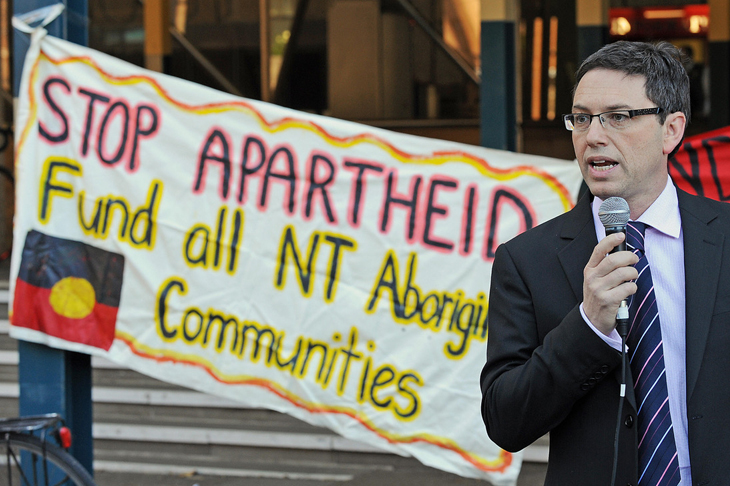One of the many issues that people have difficulty understanding about the Aboriginal Voice is whether it will lead to an avalanche of litigation. It is a serious question because, if the Voice generates litigation, it will stymie government decision-making until the lawsuits make their leisurely way through the labyrinthine processes of the courts. Effective government will grind to a halt for years.
Naturally, the government uses the same tactic on this issue as it does on the many other objections that have been raised to the Voice: it denies that it is a valid objection and, until the referendum is over, it is doing its best to keep the people in the dark and trick them into accepting that all will be revealed in due course and that, in any event, there is nothing to be worried about. It reminds me of that statesmanlike electoral reform introduced in the Central African Republic a few years ago: count the votes before, rather than after, the election. It produces a better result.
One of the reasons why people have trouble resolving the litigation question is that it can be complicated, and that is why I may be able to help by simplifying things. Here then is Brown’s Simplified Guide to The Voice and Litigation. You might like to send it to the Attorney-General, Mr. Dreyfus, and ask him if it is correct, and, if not, exactly where and why it is not correct. But don’t wait with bated breath for a reply.
Before we start, let us remember two things. First, let us assume that the referendum is passed and the Voice is established. The Voice, therefore, is now in the Constitution. That means it is not just a law that can be changed with a change of government; it is in the Constitution and, for all practical purposes, it will be there forever. Second, to be valid, all laws have to be consistent with the Constitution as determined by the High Court. Therefore, any law that tries to restrict or change the constitutional clause on the Voice will have no effect. Remember: the referendum is not a smorgasbord where you can take only the bits that you like; if you go for the Voice, as prescribed, that is what you get.
Will the Voice be able to sue? Yes, it is a legal person and has the same rights as any person or entity and one of them is to sue to enforce whatever rights it has.
What rights will the Voice have? It is created by the Constitution and is given the right to make representations or give advice to the parliament and the executive government (the public service). That right cannot be taken away because it is in the Constitution and constitution is king.
Is this a limited right or is it more? It is much more because it is the right to make representations on “matters relating to” Aboriginals. This obviously means having a connection with Aboriginals, but it does not mean, as Mr Albanese likes to say, only matters that are directly, mainly, or solely connected with Aboriginals. Nor does it mean only the big-ticket items that Ms Burney says she will ask the Voice to tackle. It means connected with Aboriginals, which is virtually everything.
What could the Voice sue about? If there is a matter coming up for decision by the government, about land, sea, mining, health, transport, education, or anything else “relating to” Aboriginals, the Voice has been given the constitutional right to make representations to the government and parliament about it and no-one can stop it. It must therefore have the right to sue to enforce that right because if you have a right, you can enforce it and you do this by going to court. Thus, any project can be stopped until the Voice exercises its right to give advice.
Won’t that right expire in time? No. It is a permanent right with no limit on how many times it can be used, or when. The Voice has the right to make representations and repeat them multiple times, if and when it wants to.
What could be the result? There is already in the Constitution a power for the High Court to issue orders to stop the government from doing things and to order it to do other things. So, the right being enforced by the Voice is a real one that will be enforced by court orders. These orders can affect the operation of mining laws, fishing rights, electoral laws, bail and probation, Australia Day, or anything else that the Commonwealth can do until the Voice exercises its constitutional right to make representations and have its say.
What about the Parliament? The right of the Voice includes even giving advice to the Parliament.
Can the Voice complain that its advice was ignored? Yes. If the Voice has the right to make representations, it must have the right to have them considered and to be given reasons if they are rejected. Otherwise, it is being denied the full extent of its right to give advice, written into the Constitution. It is therefore open to the Voice to sue if it has not been given reasons for the rejection of its advice or if it can say that the reasons given were unreasonable or wrong.
Is it only the Voice that can sue? No. It may even be open to a third party like the environment or climate change lobby to argue that as mining is clearly a matter relating to Aboriginals, the development of a new mine should be stopped until the Voice gives its opinion on whether the project should go ahead.
Conclusion: there will be litigation and a lot of it, from the Voice itself and third parties who will use it to push their own barrows. And a big thank-you from we lawyers for the years of work ahead, and especially to the taxpayers who will pay for it.
Got something to add? Join the discussion and comment below.
Get 10 issues for just $10
Subscribe to The Spectator Australia today for the next 10 magazine issues, plus full online access, for just $10.
You might disagree with half of it, but you’ll enjoy reading all of it. Try your first month for free, then just $2 a week for the remainder of your first year.















Comments
Don't miss out
Join the conversation with other Spectator Australia readers. Subscribe to leave a comment.
SUBSCRIBEAlready a subscriber? Log in